Baton Rouge native M.O. Walsh’s ‘The Big Door Prize’ adaptation shows audiences it’s never too late for re-discovery
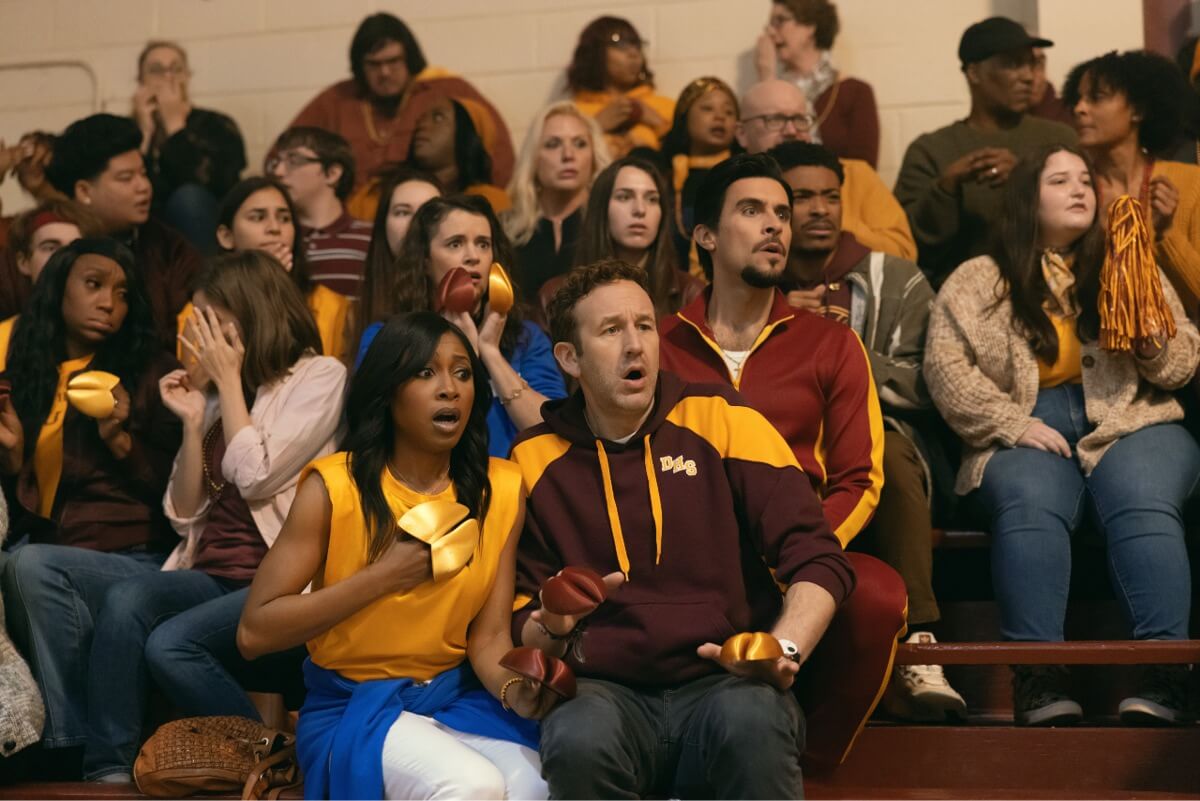
A 22-year-old art student wants to be a great painter, gets pregnant with twins, and finds this path delayed twenty years until they open a community art-influenced bakery at 42. A 23-year-old aspiring writer loses a best friend in a car accident and finds themselves cooking burgers at a corner bar while they quietly work through the trauma.
Unsure of any direction whatsoever, a 40-year-old finds themself in a stable job, with a loving family, but still unsettled in a sense of life purpose.
All of these paths happen, and one of them is a foundational piece of Chris O’Dowd’s character in Apple TV Plus’s The Big Door Prize, the television adaptation of the book “The Big Door Prize” by Baton Rouge novelist M.O. Walsh.
While Showrunner David West Read has verbatim described the show as set in a “bubble of escapism”, one could debate that The Big Door Prize is the antithesis of escapism. Ten episodes navigate thought-provoking themes that nudge the viewer into thinking about purpose, fate, and how we define our own life direction.
Take a sliver of Big, a little Click, and throw a little sprig of Ted Lasso vibes in there. The Big Door Prize is a lot of things, and at its core is a Baton Rouge creator who built a snow globe around the fictional community of Deerfield, Louisiana and infused it with heart.
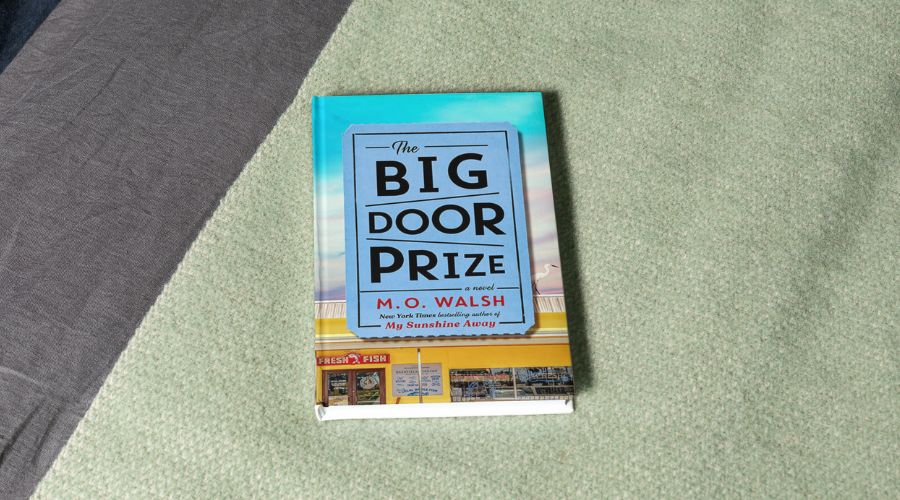
How much of The Big Door Prize is based on Author M.O. Walsh’s growing up in Louisiana?
The entire story is set in the fictional small town of Deerfield, Louisiana, which could be a composite of any small town outside Baton Rouge. In an interview with The Advocate, Walsh spoke on the core of this idea that sprouted a future best-selling novel:
I think I’ve always been interested in the idea that most people probably have something they would be really good at but have no idea just because they’ve never tried it. The greatest guitar player in the world, in other words, may have never picked up a guitar because they were not encouraged to or didn’t have the access or cultural incentives to. So, I wondered what people would do if a machine could tell them what they would be great at. Would they drop everything and pursue that idea, even if it had never occurred to them before?
Walsh is still creatively based in Louisiana – he’s an associate professor at the University of New Orleans and is the Director of the Creative Writing Workshop MFA program.
In the same interview, Walsh said that he drew “The Big Door Prize” out of a short story he wrote in grad school called “The Prospect of Magic”. Walsh’s short story collection, “The Prospect of Magic”, would go on to win 2010’s Tartt’s First Fiction Prize. “The Prospect of Magic”, like “The Big Door Prize”, was based on small-town shenanigans in Louisiana.
So, if we want to take some very loose speculative license with the context – yes, The Big Door Prize is based on Walsh’s experience growing up in Louisiana.
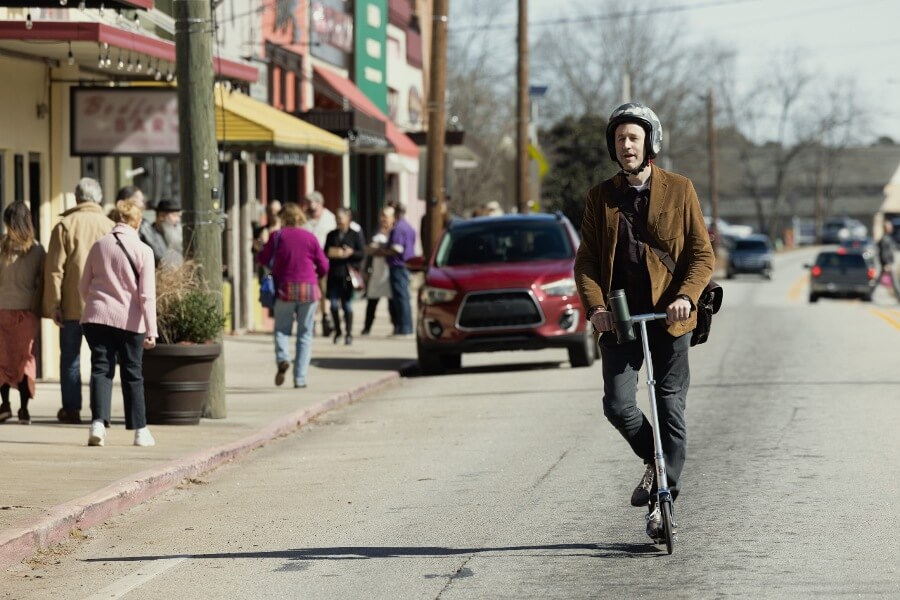
Chris O’Dowd in The Big Door Prize (photo credit: Apple TV+)
So, The Big Door Prize small-town vibe is filmed in Louisiana then, right?
That’s a big “Nope”.
The Big Door Prize is filmed in and around Atlanta, Georgia. Specifically, Deerfield is based in Loganville, Georgia. Showrunner David West Read, who wrote and produced for the small-town setting in Schitt’s Creek, mentioned the importance of this small-town community setting in a Sydney Morning Herald interview:
Part of the success of Schitt’s Creek is that it’s set in this geographically ambiguous small town, so you really focus on the bubble of that world, of this special place where these people exist.
That allows you to block out some of the outside world, so the town represents everything, and it becomes more universally accessible.
At the core of this small-community idea is the aspect of a shared uncertainty of purpose. All these people are going through the same motions, living lives they softly drifted into, and they now have the option – almost the responsibility – to ascertain a “true” purpose with the “Morpho Machine” that drops into town and supposedly can tell them their potential.
This community could be us, they struggle with decisions like us, and not everyone knows what they want – like us. Fans have also clearly noticed the bubble that gives the town an intimate familiar feel, and have compared it to Stars Hollow in Gilmore Girls:
my husband [and] i are watching the show, and i’m noticing such “small town” vibes – for example, town members running the town inn, the storekeep doing magic at the inn, giorgio opening a restaurant in his hometown, the mayor being involved in everyone’s shit.
– u/ConversationJaded541, Reddit, April 13th
David West Read did a wonderful job of adapting Walsh’s material into a sense of: you might live 2,000 miles away but feel like you’re watching these people as your next-door neighbors.
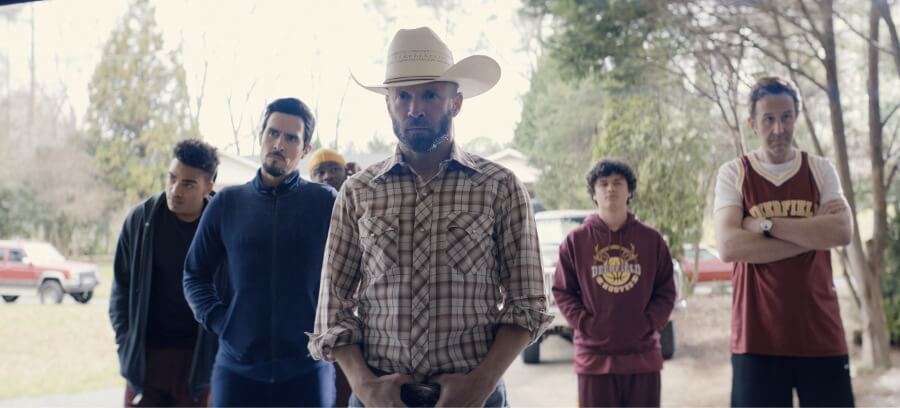
Josh Segarra, Aaron Roman Weiner and Chris O’Dowd in The Big Door Prize
(photo credit: Apple TV+)
How is The Big Door Prize On Apple TV Plus different from “The Big Door Prize” by M.O. Walsh?
M.O. Walsh commented in his interview with The Advocate that he wanted no sense of micromanagement with the television adaptation. He wrote a great book. Let the showrunner write a great script.
While “The Big Door Prize” is largely adapted faithfully for television, the major alteration seems to have been the depiction of the magical potential-telling machine in the grocery store. In the book, this machine is called the “DNAMIX”, and the show changes this to the “Morpho Machine”.
The book is still only three years old, so the technology of such a magical machine might be like hopping on Instagram in 2020 versus 2023 – the layout’s a bit different, Reels are trashier, but still largely the same. Screen Rant asked David West Read how he made the machine to project a feel of the modern day:
The fact that people have to give up their social security number and fingerprints just to get their potential felt very much like the modern world to me, where we’re constantly sacrificing security and privacy to get whatever it is we think is gonna make us happy.
A major point that did not change between the show and the book is the translation of a groundedness in empathy and reflection. In a review for NPR, Glen Weldon encapsulated what many critics saw in the show:
Again and again, characters that could have been thinly drawn yet still funny — Izzy, the town’s narcissistic mayor (Crystal Fox), Beau, Jacob’s macho father (Aaron Roman Weiner) and bluff restaurant owner Giorgio (Josh Segarra, great as always) — are given the time and attention to surprise us with layers of emotion and absurdity that make them rounded and real.
At some point early in the season — it was somewhere around the wedding episode, which features a character performing a wildly ill-considered dance number, and the townsfolk reacting to it — I realized I’d gone from laughing at these characters to laughing with them.
M.O. Walsh’s spirit of embracing common humanity was felt by fans of the book as well. From Goodreads:
It’s about seeing loneliness, seeing pain, and responding to it, not ignoring it because that’s easier sometimes. It’s about potential—for greatness, for kindness, for satisfaction in the everyday gifts each of us has. And it’s also about falling short and making amends. This is a novel with tremendous heart and what I needed to read right now.
– Susan Bernhard, Goodreads
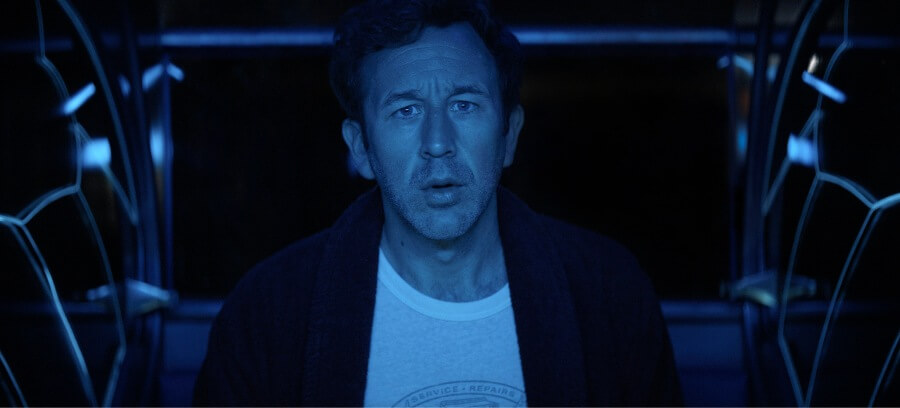
Chris O’Dowd in The Big Door Prize (photo credit: Apple TV+)
How does The Big Door Prize’s self-discovery theme fit into the zeitgeist of 2023?
“The Big Door Prize” was published in September 2020 during the peak of Covid days. Like many recent films and art in general, tones and plot points have reflected the escalation of reassessing life values. During an ensemble cast interview with The Hollywood Reporter, Gabrielle Dennis spoke about first seeing the script:
During the pandemic a lot of us shift focus, shift things that were important to us, kind of rediscovering ourselves and our purpose and all of those things. So, I think for me, reading that during the pandemic, it was very much like, my gosh, this will resonate with people because I feel like we all as a group kind of migrated to this experience together. Good, bad, and ugly, we all changed because of it.
So what do you wanna be when you grow up?
Someone asks this question and the person might plunge in and respond with an assured direction. The contrast is they might freeze up and cringe, and say something like, “I’m just taking one day at a time.”
Or, from the perspective of The Big Door Prize, we are never done growing up.
I think there’s a prototypical midlife crisis around 40, but I think it’s also, to me, the idea that at 40, the window is still very much open. Life narrows your options, but at 40 there’s still time to change paths, and there is still time to do a major reinvention of self, if you so desire. I felt like that was the right age for this character who’s our way into a story about reinvention.
David West Read, Sydney Morning Herald
Take M.O. Walsh’s journey. LSU grad. Wanted to be a musician as a youth. Steered toward literature in college. Wrote the short story “The Prospect of Magic” in 2004. Had a family. Kept working, feeling out direction, and moving forward. 19 years later, he has what could be considered mainstream fame with an Apple TV Plus television show adaptation.
“What does a person tweet when a lifetime of dreams comes true?” M.O. Walsh tweeted on March 29th.
Many of us are unsure of what this looks like. Many are still working to define their dreams.
Like the fictional citizens of Deerfield, Louisiana, no matter what path we’re currently walking, we have a shared human experience:
It’s never too late to rediscover oneself.
Share this article
SUBSCRIBE TO OUR WEEKLY NEWSLETTER
No spam, we promise! Just the latest on Louisiana filmmakers.

Fable House is a video production company based in Baton Rouge, Louisiana that specializes in production for film, video, commercials, and TV. Our team are experts in physical production, post-production, and VFX. We produce content for major brands, TV networks like Syfy and Lifetime, and provide production services to Louisiana’s never-say-die indie filmmakers.
